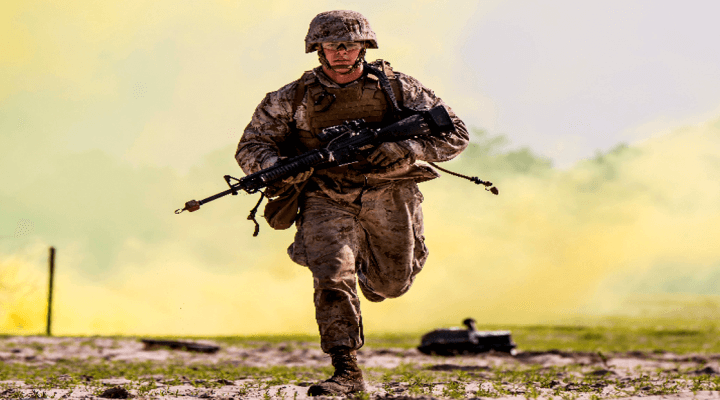“Roger your last, Bravo Six. Can’t run it any closer. We’re hot to trot and packing snake and nape, but we’re bingo on fuel.” – Platoon
We have a language all our own. There’s no denying it. Whether you’re a marine, a soldier, an airman, or a sailor, we share a language and dialect that is truly unique. Our language is replete with terms that no one outside the profession of arms would use on a regular basis, and our dialect is punctuated with profanity that rolls off the tongue as naturally as some people say “please” and “thank you.”
But as we transition from servicemembers into veterans, some of those terms – and much of our dialect – transition with us. Four years after my own transition, my day-to-day conversation is still littered with those terms and I fight a constant struggle to refrain from including profanity in my daily interactions. Only recently, I wrote about this phenomenon, noting that my new colleagues seem to have adopted some of my own bad habits.
So, it was with no surprise when I came across a story about how the slang terms in use during World War I found their way into common language following the war. It was more than a legacy of the fighting, it was a reflection of the “rich mixture of soldiers’ dialects, accents, nationalities, languages, and even social backgrounds.” While many of terms faded with time, some remain to this day – phrases such a “zig-zag,” “Kiwi,” “shell-shock,” and “dingbat.” Each war seems to add to our language, and each generation of veteran appears to contribute, as well.
The Forever Wars – the post-9/11 wars in Iraq and Afghanistan – are no different. As we are not completely disengaged from those wars, it’s difficult to say which of the terms of our generation will “stick” and which will be forgotten. However, it’s a good bet that some of these will be in wide use for years to come.
“Shock and Awe”
No matter what you think about the necessity of the second invasion of Iraq, it gave us one of the most unforgettable terms of our generation. Today, the term is synonymous with carrying an overwhelming fight to your opponent, whether in sports or the corporate world.
“Groundhog Day”
To be fair, there is nothing new about Groundhog Day, and the true source for the contemporary use of the term – a situation that seems to repeat itself endlessly – is the iconic 1993 Bill Murray film. But nearly 20 years of seemingly endless war will ensure the phrase lives on in perpetuity. We’re all Phil now.
“Strategery”
Like Groundhog Day, Strategery owes its origin to something other than the military, despite its widespread adoption in headquarters across the armed forces. Walk into a planning meeting just about anywhere, and the term “strategery” will likely be in use, if not in practice.
“Fobbit”
Most of us credit Bob on the FOB creator A.J. Merrifield with memorializing much of our wartime language in his artwork, the most infamous of which is probably “Fobbit.” Even if the term doesn’t find widespread use in the public sphere, we are surrounded by Fobbits in both military and civilian life, people who avoid leaving the FOB – or the office – at all costs.
“Geardo”
Another term captured by Merrifield, The Geardo was that special breed of soldier who chose to purchase (or otherwise obtain) the latest and greatest tactical gear, regardless of whether said gear was of any actual use to him. While the term might not catch on in civilian language, the Geardo’s cousin – the “vet-bro” – will, with his “tacticool” style, deployment-grade sunglasses, and DD-214 splashed across the rear window of his pickup.
“Wasta”
An Arabic word that loosely translates to “clout” or “influence”, wasta is a term that will undoubtedly find it way into common usage. Most of us learned the hard way how important wasta was to getting anything done in Southeast Asia, and it’s not a word that we’ll ever forget. If anything, the very act of building wasta will permeate our language, and hopefully in a good way.
“Inshallah”
Frankly, I don’t see this particular Arabic word making its way into our language, but maybe it should. Most of the time I heard “inshallah” in practical use, the translation wavered between “yeah, and monkeys might fly out of my butt” and “it is what it is.” In either case, it might be a positive, yet subtle, addition to our lingo.
“High-Value Target”
Often referred to in our parlance as “HVT”, this term is not exactly of the type you’d expect to find used in civilian circles. Surprisingly, I’ve lost count of the number of times I’ve heard this term used in business, industry, and even government. Of all the terms we use, HVT was one I expected to cause the most angst among our civilian counterparts. Man, was I ever wrong.
“Bright Idea Fairy”
I don’t care where you go to find employment, there are Bright Idea Fairies (or Good Idea Fairies) around every corner. We owe it to ourselves and to those who suffer from their presence to ensure that this term remains in wide use. The best way to change such behavior is to draw attention to it in the least complimentary way possible.
“Schwack”
This remains one of my “go-to” phrases in post-military life, although it typically elicits the use of appropriately-profane dialect. Though I use it more often in describing situations or obstacles to progress, it conveys the same sense of determination I might have used at one time when seeing someone sauntering down the street with an RPG-7 over their shoulder. And, let’s face it, when you say you’re going to schwack something, everyone knows what you mean.




